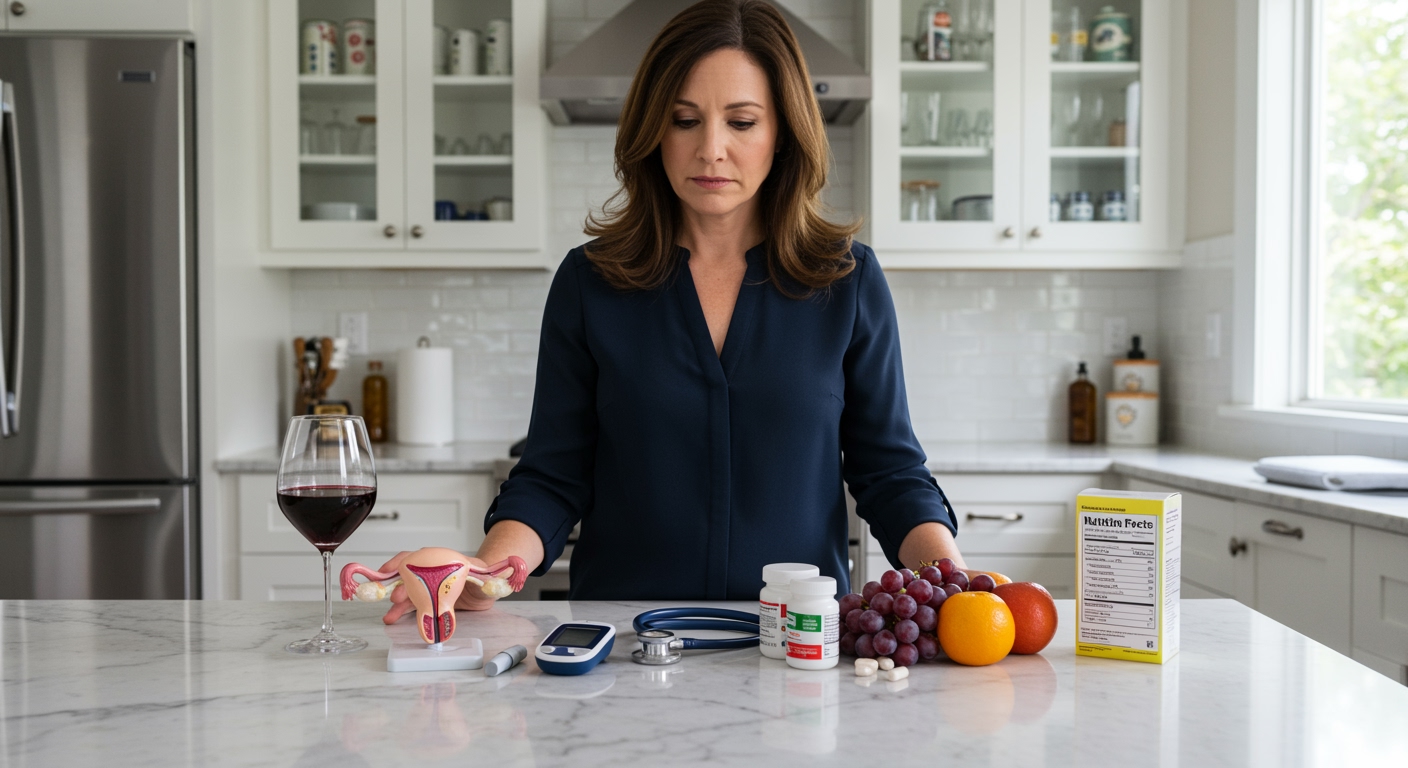✪ Key Takeaway: Wine can worsen PCOS symptoms by disrupting hormones, increasing insulin resistance, and triggering inflammation.
Introduction
You pour yourself a glass of red wine after a stressful day, but then worry creeps in about your PCOS symptoms.
Many women with PCOS wonder if their occasional glass of wine is sabotaging their health goals and making their symptoms worse.
Hi, I’m Abdur, your nutrition coach, and today I’m going to explain exactly how wine affects PCOS and whether you need to give it up completely.
How Does Wine Affect Your Hormones With PCOS?
Wine contains alcohol that directly interferes with your liver’s ability to process hormones properly.
Your liver normally breaks down excess estrogen and testosterone, but alcohol disrupts this crucial process.
When your liver is busy processing alcohol, it cannot effectively clear these hormones from your bloodstream.
This leads to higher circulating levels of androgens like testosterone, which worsens PCOS symptoms such as acne, hair growth, and irregular periods.
Alcohol also increases cortisol production, your primary stress hormone that can further disrupt your reproductive hormone balance.
Even moderate wine consumption can shift your hormone ratios in ways that make PCOS management more challenging.
✪ Fact: Your liver prioritizes alcohol metabolism over hormone processing, creating a hormonal traffic jam that worsens PCOS symptoms.
Does Wine Spike Your Blood Sugar And Insulin?
Wine contains natural sugars that can cause blood glucose spikes, especially in sweet varieties.
Your pancreas responds by releasing insulin to bring blood sugar levels back down to normal.
Women with PCOS already struggle with insulin resistance, meaning their cells do not respond properly to insulin signals.
Adding wine to this equation forces your pancreas to work even harder, producing more insulin to manage the sugar load.
Higher insulin levels trigger your ovaries to produce more androgens, creating a vicious cycle that worsens PCOS symptoms.
Red wine typically contains less sugar than white wine, but both varieties can still impact your blood sugar control.
The alcohol itself can also cause delayed blood sugar drops, leading to cravings and overeating later.
✪ Pro Tip: Check wine labels for residual sugar content and choose dry varieties with less than 4 grams per liter if you decide to drink.
What About The Resveratrol Benefits In Red Wine?
Resveratrol is a powerful antioxidant found in red wine that some studies suggest may help with PCOS symptoms.
Research shows resveratrol might improve insulin sensitivity and reduce inflammation in women with PCOS.
Some studies found that resveratrol supplementation helped lower testosterone levels and improved menstrual regularity.
However, the amount of resveratrol in wine is relatively small compared to what was used in these research studies.
You would need to drink large amounts of wine to get therapeutic doses of resveratrol, which would cause more harm than good.
The alcohol content negates most potential benefits by disrupting hormones and increasing insulin resistance.
You can get resveratrol from other sources like grapes, berries, and supplements without the negative effects of alcohol.
✪ Note: The resveratrol benefits do not outweigh the hormonal disruption caused by alcohol in wine for women with PCOS.
Can Wine Increase Inflammation In Your Body?
Alcohol triggers inflammatory pathways in your body that can worsen PCOS-related inflammation.
PCOS is already characterized by chronic low-grade inflammation that contributes to insulin resistance and hormone imbalances.
Wine consumption increases inflammatory markers like C-reactive protein and interleukin-6 in your bloodstream.
This additional inflammation makes it harder for your body to respond properly to insulin and regulate blood sugar.
Chronic inflammation also interferes with normal ovulation and can worsen symptoms like irregular periods.
Your gut health suffers from alcohol consumption, leading to increased intestinal permeability and more systemic inflammation.
✪ Fact: Even moderate alcohol consumption can increase inflammatory markers that make PCOS symptoms more difficult to manage.
Should You Completely Avoid Wine With PCOS?
Complete avoidance is not always necessary, but significant moderation is crucial for managing PCOS effectively.
If you choose to drink wine, limit yourself to one small glass per week rather than daily consumption.
Choose dry red wines with lower sugar content and higher antioxidant levels when you do indulge.
Always consume wine with a meal containing protein and healthy fats to slow sugar absorption.
Monitor your symptoms closely and eliminate wine completely if you notice worsening acne, irregular periods, or weight gain.
Consider that your individual tolerance may be different based on your insulin sensitivity and hormone levels.
Focus on proven PCOS management strategies like balanced nutrition, regular exercise, and stress reduction before worrying about occasional wine consumption.
✪ Pro Tip: Track your PCOS symptoms in relation to wine consumption to determine your personal tolerance level.
The Bottom Line
Wine is not inherently evil for PCOS, but it can definitely make your symptoms worse through hormone disruption, insulin spikes, and increased inflammation.
Your health is worth more than any temporary pleasure from alcohol, and managing PCOS requires making choices that support your long-term wellbeing.
I would love to hear about your experiences with alcohol and PCOS symptoms, so please share your thoughts or questions in the comments below.
References
At NutritionCrown, we use quality and credible sources to ensure our content is accurate and trustworthy. Below are the sources referenced in writing this article:
- PCOS Nutrition: Alcohol and PCOS
- Smart Fertility Choices: PCOS and Alcohol
- UNSW Newsroom: Is the Red Wine Compound Resveratrol a Miracle Drug for Infertility
- The PCOS Dietitian: Alcohol and PCOS





